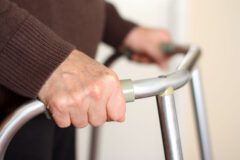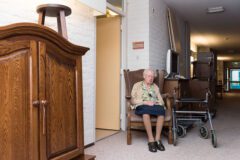Can You Sue for Sepsis in Nursing Homes?

Sepsis is a life-threatening chain reaction in the body that typically occurs in response to a bacterial infection. Sepsis can lead to organ failure, tissue damage, and death without immediate and swift treatment.
Because adults over 65 have weakened immune systems, they are often at a higher risk of contracting sepsis. This means nursing home patients are particularly susceptible to developing sepsis, especially those with underlying health conditions such as diabetes, kidney disease, lung disease, and cancer.
Sepsis in nursing homes is usually the result of nursing home negligence and the failure of staff members to recognize a patient exhibiting symptoms of the condition.
So what are the signs of sepsis, and what can you do if you or someone you love has suffered due to developing the condition? Read on to learn more.
What Causes Sepsis?
Sepsis occurs due to an infection causing a severe over-reaction by the immune system, which results in septic shock. This causes a dramatic drop in blood pressure that can lead to organ failure and death.
The infections most likely to cause sepsis include stomach, kidney, and lung infections. However, it’s certainly not limited to these specific instances— sepsis can even occur in something as small as an infected wound or catheter site infection.
Symptoms of Sepsis
The more rapidly sepsis is treated, the better the chance for recovery. Common signs of sepsis include:
- Rapid breathing (typically 22 or more breaths per minute)
- Tachycardia (rapid heart rate)
- Mental confusion or disorientation
- Pain or discomfort
- Clammy, cold, or sweaty skin
- Fever or shivering
- Rapidly decreasing blood pressure
- Organ failure
- High levels of lactic acid in the blood (which indicates your cells aren’t utilizing oxygen efficiently)
If any of these symptoms occur, it’s vital to seek treatment immediately.
What is Septic Shock?
If left untreated, sepsis can develop into septic shock. During septic shock, blood flow becomes restricted to the vital organs due to abnormal blood clotting. The residual pressure build-up and toxins released by bacteria can then cause blood vessels to burst, destroying tissue and causing dangerously low blood pressure—eventually resulting in organ failure. According to the Mayo Clinic, while the majority of people recover from mild cases of sepsis, the mortality rate for those who experience septic shock is around 40%.
Sepsis in Nursing Homes
Nursing home patients are particularly vulnerable to developing sepsis due to the population’s prevalence of pressure sores, urinary tract infections, and surgical wounds. This, coupled with a weakened immune system, places them at an increased risk of experiencing septic shock. In fact, according to a research article from Frontiers in Medicine, the mortality rate of severe sepsis and septic shock in patients over the age of 85 was calculated to be between 50-60%, a rate 1.3-1.5 times higher than in younger patients.
Similarly, a 2018 report conducted by the Chicago Tribune found that between 2010 and 2018, over 8,000 lawsuits were filed against nursing homes due to failure to prevent or treat sepsis. Additionally, they found that over 25,000 nursing home patients suffer from sepsis each year in the United States.
Why Is Sepsis So Common In Nursing Homes?
The answer often lies within a nursing home staff. Staff shortages and poor training can cause potential infections to go unnoticed and patient care to suffer. Additionally, poor infection control procedures concerning bed sores, catheter placements, and feeding tubes can increase the risk of a serious infection developing in residents.
Is Sepsis a Result of Nursing Home Neglect?
Sepsis is a form of nursing home neglect. Because of that, legal action can be taken if your loved one develops sepsis. By law, nursing homes must provide a certain standard of care for their patients, including recognizing signs of patient illness, treating them for illness, and transferring them to a hospital when necessary. When this fails to happen, the facility is liable for negligence.
Sepsis is a highly treatable condition that is easy to avoid by recognizing the early warning signs.
Unfortunately, due to staff shortages, lack of training, or poor infection protocol, the early signs of sepsis can go unnoticed in many nursing homes. A patient’s health can quickly decline without adequate protocols to check pressure ulcers, bed sores, body temperature, and vital signs.
What Can Be Done if My Loved One Develops Sepsis Due to Nursing Home Neglect?
If a nursing home staff’s negligence resulted in your loved one developing sepsis, you are entitled to legal action.
A civil suit against the facility can ensure you hold them accountable for the actions and prevent further harm from occurring to their other residents. Additionally, if your loved one passed away due to neglect at a nursing home facility, you can pursue damages for wrongful death. A skilled attorney specializing in nursing home abuse and wrongful death suits will help you to receive the compensation you and your family deserve.
Conclusion
Sepsis is a preventable condition that disproportionately affects the elderly, especially those in nursing homes. Negligence is often the root cause for patients developing sepsis, as untreated bed sores, wounds, and unsanitary conditions can lead to complicated infections.
If your loved one has been harmed or passed away due to sepsis, you are entitled to seek legal action against those responsible. You also may be eligible to receive compensation for your economic and non-economic damages. Speak with a seasoned lawyer to see if you have a serious case and can recover damages.






